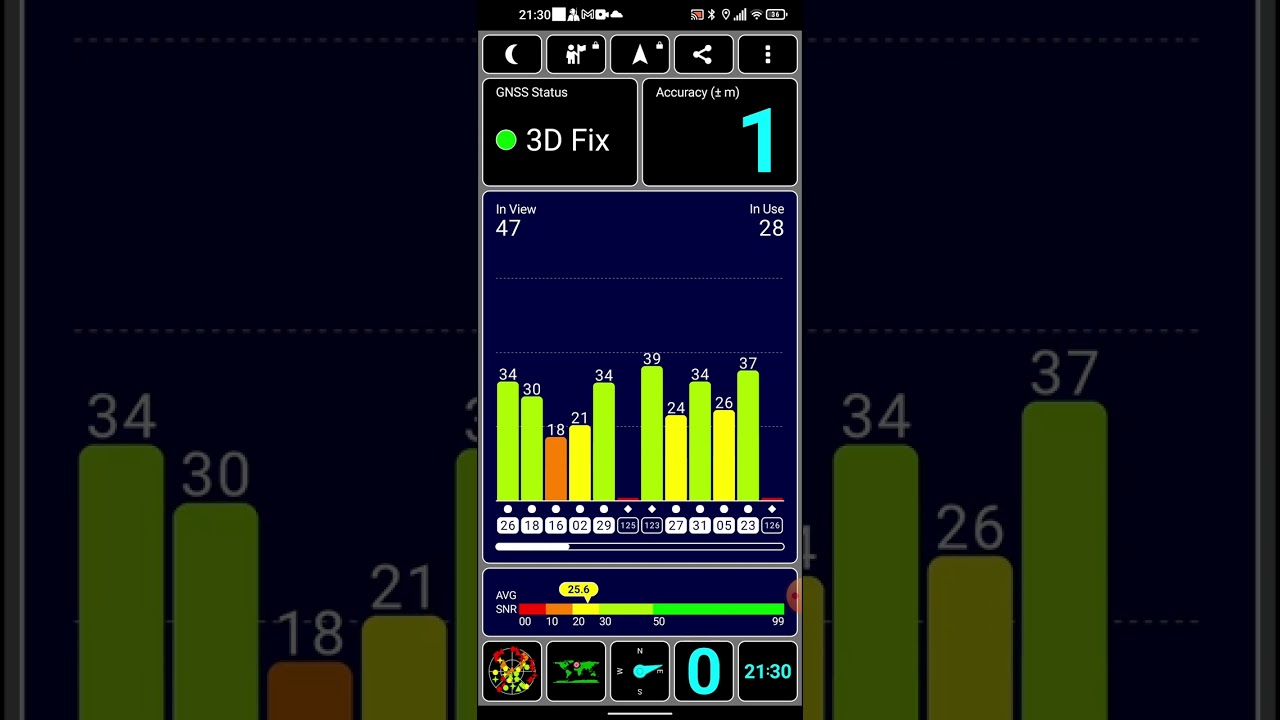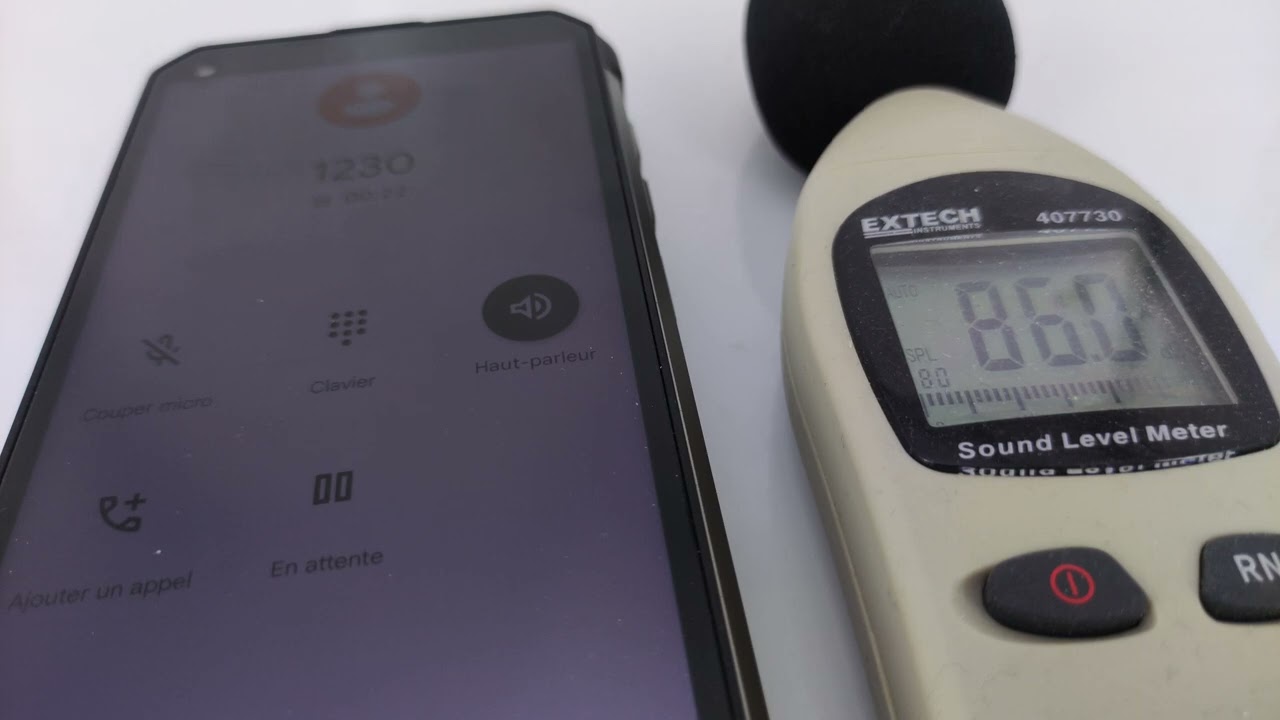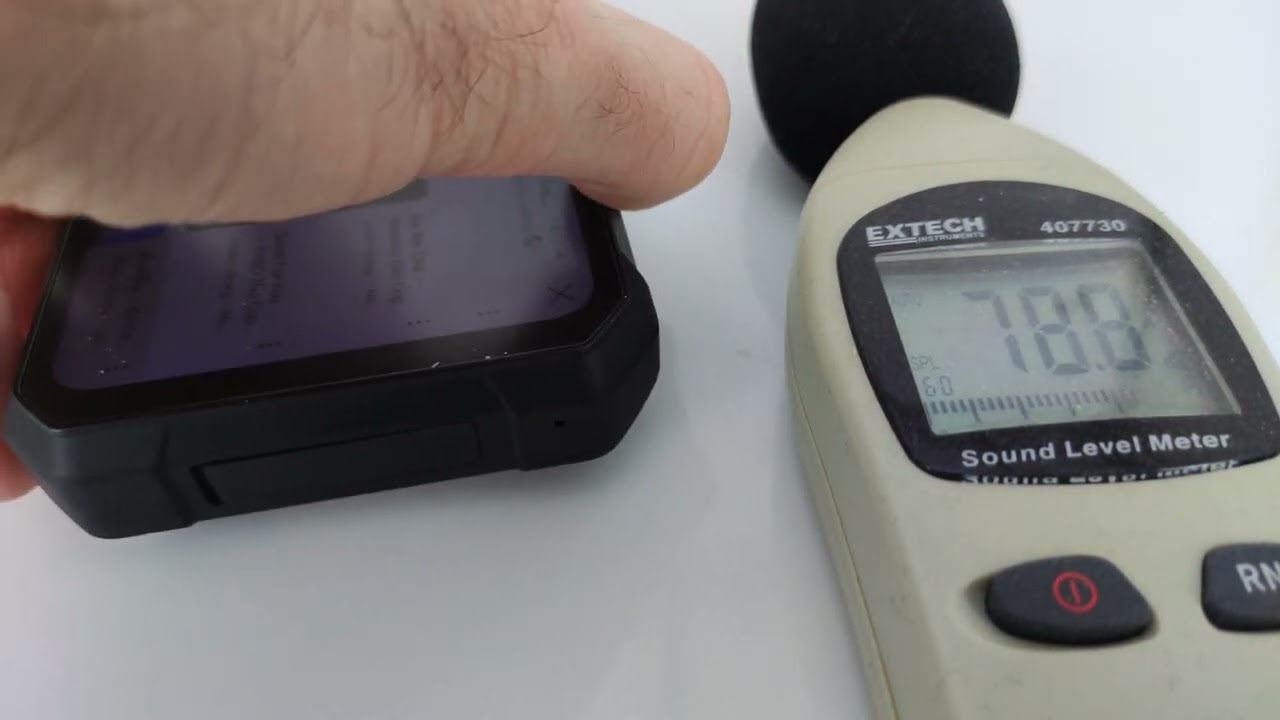Smartphones
Unihertz Tank : test / review
Published on: 19-12-2022 / Modified: 01-10-2023
We live in a society where brands seek to please even if it means sacrificing things and this is sometimes done against common sense. I test a lot of smartphones that fall into this category, these smartphones do not bring much new, they are not bad phones but owning them is an emotional choice. Fortunately, there are a few exceptions with brands that take risks and sail against the current by offering a slightly different product. This is the case of Unihertz, a company I had never heard of and which offered me to test its Unihertz Tank...it's all in the name!
Now imagine yourself in another world, after an invasion of zombies for example, what would you do with your beautiful phone? With the Unihertz Tank your chances of survival will be much higher because if you ever run out of the 22000 mAh battery, you can still use the phone to defend yourself, the beast weighs 560 grams!
Video test

Manufacturer web site:
https://www.unihertz.com/
Site where I have bought the Unihertz Tank:
https://www.unihertz...
Structure of my tests
I test the phones according to a pre-established structure (see below) to provide you with as much information as possible. Unfortunately, this takes a long time. Some tests like network performance tests take several days and for photo tests I sometimes have to wait until the weather is suitable to take pictures in good conditions. I am therefore obliged to publish the tests step by step, so I invite you to come back if the test is not complete at the time of your visit.Price Unihertz Tank
The list below shows the prices for the Unihertz Tank from more than 50 sites around the world. If you are not satisfied with any price, you can subscribe to a price alert to be the first to be notified when the price drops.The above links are affiliate links from companies such as Amazon, Gearbest, Aliexpress,... If you appreciate my work, I would be grateful if you could purchase these products through these links. It costs you absolutely nothing but I get a small commission that allows me to buy the material I test. Thank you very much!
Timeline
December 19, 2022: reception of the phone, the test can begin.Why this phone?
I test all kinds of phones and I test them with the same objectivity, regardless of the brand or type of smartphone. Unlike many sites offering smartphone reviews, I also test smartphones from little-known brands and also rugged type smartphones that are aimed at a very specific audience. The Unihertz Tank is not for clumsy people who sometimes drop their phone from their pocket, it is a phone that should be considered as a tool for those who have work where the risk of damaging a smartphone is great. I am also thinking of adventurers who go to remote areas without being able to charge the phone.This phone is clearly a very exotic model compared to the phones I usually test. I've already tested phones of this type but this one doesn't cut corners, we have heavy artillery here and I find it quite comical to test. Phones of this type often neglect the software part, the performance or the photo and this is normal given their primary usefulness. From a purely theoretical point of view, this is not the case with this phone because it should be capable, smooth and able to take detailed photos. It also has an infrared sensor that will allow you to take photos (and even videos) at night.
Unpacking
The box contains the phone, a charger, a charging cable, a screen protector (I wonder what it could be used for) and a manual.
First configuration
The Unihertz Tank runs on Android 12, so the startup procedure is almost the same as on other phones running the same version of Android 12. I just noticed a difference on a screen where you have to choose an individual or family profile , I hadn't seen this on an Android phone before.Finish
You really have to have this phone in your hand to realize how massive it is, it's not a phone that will easily fit in a pocket but if you drop it, remember to remove your foot because with its 560 grams, your foot may have a bad time.
Specifications
The information below comes from the Device Info HW application. The application provides detailed technical information about the tested phone. The Unihertz Tank runs on the same architecture as the Poco M5 but I will come back to this point in one of the following paragraphs. I hadn't received a detailed technical sheet with the phone, so I had to dig a little into its technical characteristics to understand what it was made of. The fact that it runs on the same architecture as the POCO implies that it shares the following components: CPU, GPU, modem, wifi chip, gps chip,... A priori from a technical point of view it should therefore have performance quite similar to POCO except that its huge armor could play a role in network sensitivity but this point will be tested later in this test as well.
This phone is generous in terms of memory because with 8Gb of RAM, you will have no problem leaving a large number of applications open and its 256 Gb of storage will allow you to store many photos and videos. My memory test also shows that this memory is quite fast, so this phone is quite fluid to use, it does not suffer from slowdowns. I see it is also wifi6 compatible but I don't have a compatible router so I couldn't test this type of protocol. In any case, for a rugged type phone, Unihertz has not neglected its technical sheet because even if the POCO M5 is an entry-level phone, it offers a good level of performance and that is quite a rare thing. for telephones like the Unihertz.
CPU / GPU Performance
As I wrote in the previous paragraph, this phone is equipped with a Mediatek Helio G99 CPU, it is the same CPU as the POCO M5 and for the GPU it is the same as well, it uses a Mali-G57MC2. The POCO is an entry-level phone that offers performance of a mid-range phone, so it should not be taken as a benchmark. This kind of gear allows the Unihertz to respond quickly when you need it, I didn't even notice any slowdowns when I used the camera's 108MP mode.
Benchmark Antutu/3DMark
I obtained a score of 313766 points with Antutu, it is 16% better than the POCO M5 which nevertheless uses the same hardware. This difference comes from better GPU and memory performance. A priori this phone is not designed for gamers but with such performance it will be able to run most games in good conditions and with such a battery you will be able to play much longer than with a POCO M5. The other advantage that gamers might be interested in is that the temperature did not rise during the benchmark with Antutu, not even one degree!Energy performance
The energy performance of this type of phone is important because it it is she who will determine if the battery will be well used and if these 22000 mAh will allow you to use the phone for a very long time before recharging it. As with other phones, I pushed this Unihertz hard for several minutes to isolate the performance of each component.Average CPU consumption when pushed all the way: 1.26W
Average GPU consumption when pushed all the way: 2.2W
Average consumption of the FPU when pushed to the limit: 3.94W
When these 3 components are pushed to the limit at the same time, the consumption rises beyond 8W with a little loss of efficiency.
Average battery temperature over the duration of the test: 31°C (with a starting temperature of 27°C and 36°C after 8 minutes of testing)
The screen seems to consume approximately 1W which is quite low for a screen of this size (the brightness was at 50%).
What should we take away from these figures?
From a purely performance point of view, this second test confirms that this phone is more performance than the POCO. The Unihertz has more efficient power management which combined with its huge battery should result in gigantic battery life, this phone has above average power efficiency.
Gaming
To test the performance in game, I download the mobile PUBG game and evaluate the in-game experience, graphics level and depth of vision. This game is quite demanding and should help you evaluating the performance of a phone.

Network performance
The Unihertz Tank offers very wide coverage of 3G and 4G frequencies, it is compatible with certain frequencies that are quite rare on other phones. No problem to use it in Europe but without having checked each country individually, I think we can consider that this phone is a global phone that can be used in many countries outside Europe.Signal 4G (from December 2020)
I decided to change the methodology for measuring the network because I noticed that the configuration of the mobile network changes over time. This makes it more difficult to compare phones because the conditions are no longer exactly the same.
To overcome this problem, I set up a device that captures 24 hours a day about ten parameters from the mobile network (ex: cell id, rssi, rsrq, snr, frequency,...). I then place the phone next to the device for 24 to 48 hours taking the same measurements so that I can compare them.
Overview of the phones tested with this methodology
Download/Upload speed
To test the download speed, I have identified some 4G cells offering good performance where I test all my devices several times to see what download and upload speed they can achieve.
Wifi performance
To test a phone's ability to receive the network properly, I take measurements near my router and then remotely (and always at the same place). This gives me an average in dBm where a value of -90 dBm indicates poorer performance than a value at -30 dBm.Wifi signal
I expected to observe a small degradation in wifi performance compared to the POCO M5 and it is indeed the case but the difference is not as significant as I imagined. I had obtained an average signal of - 17dBm with the POCO and I obtained -23dBm with the Unihertz, so it's less good but it's still quite acceptable. For my remote router test I see the same type of difference with -56dBm for the POCO and -59dBm for the Unihertz. This phone is therefore a little less sensitive but ranks average.
Download/Upload speed
To test the speed in Wifi, I connect to my router in 2.4Ghz and 5Ghz (if available) and use the Ookla application to measure the speed.
GPS performance
To test the accuracy of the GPS signal, I use two positioning applications to evaluate the difference between the actual position and the position indicated by the phone. This test is done outdoors with nothing to obstruct the signal. An accuracy level of up to 3 meters can easily be corrected by an application (e.g. Google Maps).

Battery range
To test battery life I developed an application that measures the battery level minute by minute until the battery is empty. This application consumes about ten percent of the phone's resources and I do a test with 100 brightness. This test aims to reproduce a contemplative use of a phone (e.g. surfing the internet, reading articles, spending time on social networks). These results are not valid for intensive gaming/streaming use. The Unihertz Tank is by far the phone with the biggest battery of all the phones I've tested and with a battery of this size I expected 2 things: a very long charging time and an incredible battery life. I was wrong on both counts. First of all, there is the charging time, which is quite fast for a battery of this size, but only if you use a fast charger. With my UGREEN 100W, I charged the battery from 3 to 100% in 188 minutes. It's still 3 hours but with such a battery size it's an excellent performance. The charging is quite linear even though the graph below has an anomaly, my metering app lost units of time at one point which made the charging appear to be faster at the end. It's not, I measured the time units by hand to get 188 minutes.Photo camera test
To test the quality of photos produced by a phone, I do a technical test (resolution, sharpness, chromatic aberration,...) in studio (identical conditions) to evaluate the technical part objectively. From the second half of 2020, I built my own laboratory to take completely objective technical measurements. I then take pictures in real conditions to see how the camera performs. I then evaluate these photos according to my criteria but I publish the photos so that you can evaluate the result according to your criteria.Hardware
The Unihertz uses a 108MP Samsung S5KHM2 sensor as the main sensor, this sensor is quite common in Xiaomi (Redmi Note 11 Pro, Poco X4 Pro,...) but this is the first time I've seen it in my phone robust. Don't let the pixel count influence you too much because that doesn't mean anything, this sensor is a mid-range sensor that can deliver good results but in the price range of this phone there are better sensors.The selfie sensor is a Sony IMX 350 with 32 million pixels, it's also a fairly common sensor in classic phones, it's also the first time I've seen it in a rugged phone.
Besides these classic sensors, there is also a macro sensor and an infrared sensor.
Unihertz has therefore not neglected the more recreational part of its phone because by using these sensors you will not have to make any sacrifices for the photo.
Photo quality
Photo quality (indoor/studio)
The studio test is carried out under the same conditions so that the results can be compared on an equal basis. I calibrate my lighting for each test to obtain the same brightness and colour temperature. This test is a preliminary analysis of the technical qualities of a camera. Most phones fail this test, so you should also read the results of the other tests in the following paragraphs.
Main sensor: 108MP Samsung S5KHM2
This phone is also equipped with an infrared camera that allows you to take photos in the dark, here is an example:
Photo: technical test
I was inspired by industrial technical tests to create my own technical test to evaluate the technical quality of a camera. This test is an objective assessment of a camera's ability to render a scene correctly.
I test the following elements:
- centre sharpness, peripheral sharpness
- colour fidelity based on 24 reference colours
- level of chromatic aberration
- dynamic range (ability to capture dark and light areas without loss)
- distortion
The technical evaluation may differ from the subjective evaluation as the feeling of a photo will be influenced by the processing provided by each manufacturer.
Main sensor: 108MP Samsung S5KHM2
This phone is also equipped with an infrared camera that allows you to take photos in the dark, here is an example:
Outdoor photo quality
Test photo / night
Not yet available / tested
Video quality
Stabilisation

Video normale conditions

Video low light
Not yet available / tested
External audio quality
This test is intended to give you an overview of the volume and sound quality during calls and when listening to music through the external speakers.
Audio quality / calls

Audio/music quality

Audio quality (headphones)
To test the quality of the phone's audio output, I connect the device's audio output to a measuring tool, then play sounds on all frequencies and measure the differences between the original sound and the sound produced by the phone. In this way I measure the phone's ability to correctly reproduce all sounds.Screen quality
To test the screen, I use a colorimetric probe that measures the color accuracy of a screen, as well as other parameters to see if a screen is able to correctly reproduce an image. I also test the brightness level to determine if the screen will be able to display an image in full sunlight.Colorimetry
I got a dE of 9.51, that's a lot compared to other phones I've tested and it's especially on blue tones (blue, cyan) that the color difference is the most important. The image is therefore generally very cold and I have not found any parameters to modify the color temperature.
I measured a white temperature of 10906K with a dE of 17.5. The protective film plays a part but I imagine that even without the protective film the color difference would still be present because the difference is too great. The color space is also smaller than the usual space. This screen is therefore not a reference in terms of colorimetry.
Brightness / Contrast
The screen has a brightness of 400 cd/m² and despite the projection of light in the sensor, I was unable to increase the brightness beyond this limit. The light sensor may be located elsewhere but I couldn't find it. This brightness is a bit limited to be able to read the screen in good conditions under the sun.
I measured a contrast ratio of 1941:1, it's an excellent score for this type of screen but as for the other measurements, the screen protection plays without doubt a role here as well.
Biometry
This phone is equipped with a fingerprint sensor located on the start button, this sensor works very well and is quite fast.Operating system
The Unihertz Tank runs on a native version of Android, so there are no unwanted app additions apart from the presence of a toolbox containing all sorts of specific apps for this phone. It includes the following tools: noise test, compass, flashlight, spirit level, peak hanging, heart rate (measurement by the camera), measure height, magnification, alarm, step counter, plumb line, protractor, pressure, speedometer, underwater camera, camp lamp. This confirms once again that this phone is a real survival tool that is intended to be used in more extreme conditions than the everyday life of everyone.
Encoutered bugs
Not yet available / testedAccessories Unihertz Tank
Compare Unihertz Tank with the others
Test / Review conclusion
There aren't many rugged phone reviews on the internet and that's a shame because some of these phones are definitely worth checking out and this Unihertz Tank is one of them. It's by far the most massive and heaviest phone I've tested, but it's an assumed choice to be able to carry a 22,000 mAh battery, it's almost a survival phone. Beyond its brutal appearance, it's a very powerful phone with a good photo sensor and good sound quality. It therefore manages to bring together the world of rugged smartphones with that of traditional smartphones, so you no longer have to make any sacrifices.
This phone positively surprised me on several levels. It is capable enough to play most games and its huge battery allows you to play for a very long time without overheating problem. Network sensitivity is also very good which can be useful if you are using this phone in places with poorer network coverage. The screen is really very large despite the edges, it does not have exemplary colorimetry but the protection certainly plays a role. The sound level in calls is above average and the sound quality through headphones is excellent. The GPS offers above average accuracy.
back to my zombie invasion example from the beginning of this article, I can now say that this phone is the best candidate. If you are the sole survivor, you will survive longer with this phone. All the ingredients necessary for survival are there: good GPS, good network sensitivity, good autonomy, solidity, very powerful flash lamp, night vision (up to 10-15m), ... and if you have a little time left to kill, you will also be able to play with this phone.
Strengths
Durability
Screen size
4G network sensitivity
GPS signal
Performance
Sound quality
Call volume
Video stabilization
Battery
Weaknesses
Weight
Size
Colorimetry
External speaker sound quality
Photo
Alternatives to this product
Not yet available / tested
 LAURENT WILLEN
LAURENT WILLENHead of myself on this blog
I share my passions on my blog in my free time since 2006, I prefer that to watching nonsense on TV or on social networks. I work alone, I am undoubtedly one of the last survivors of the world of blogs and personal sites.
My speciality? Digital in all its forms. I have spent the last 25 years working for multinationals where I managed digital teams and generated revenues of over €500 million per year. I have expertise in telecoms, media, aviation, travel and tourism.












































Questions/Comments